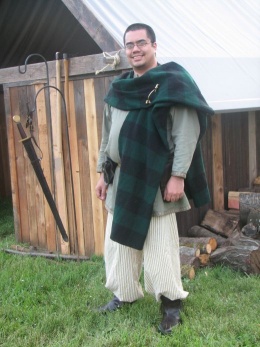Taðkr ormstunga

Summary
Originally Tadhg the Thinker, Taðkr began participating in the SCA during the summer of 2000 as a guest of the House of Hormones in the Barony of Three Mountains. In 2001 he became man-at-arms to Sigurd the Dark and became a permanent member of the House of Hormones. When the House of Hormones joined the Village of Bjorgvin in 2002 a series of events surrounding his oath swearing resulted in him being inadvertently named "Loki" by then Konungr Finnr Skeggison. Taðkr embraced this new twist on his persona and is known in the Village of Bjorgvin simply as "Loki" to this day.
In 2003, Taðkr moved south to the Shire of Cour du Val. By the time he registered his name in 2006 his persona had developed a strong Norse slant; so he opted for the Norse spelling of "Taðkr" and adopted the byname ormstunga, meaning "serpent tongue." In 2007 along with Senen meśou-nešed, Toomachi no Shichiro, and Anejiro no Tamiko, he began attracting members and forming a new house, becoming goði of House Jormungandr.
Persona
Tadc MacBeccáin, son of Beccán Riabaig, was born in the Kingdom of Osraighibh in Ireland in the year 908. In 919 his father joined Niall Glundub, the Cenél nEógain king of Tara, in the Battle of Dublin against the northmen and was killed. Tadc continued supporting his mother for three years after that, but left home in 922 looking for higher paying work near the emerging norse trade towns. With few marketable skills, no land, and no worldly experience, he soon resorted to robbery in order to make his living.
This continued off and on for some time, until one day in a Dublin pub he picked a fight with a north man. If you asked him today he'd tell you he did it for nothing more than the thrill of fighting, but whatever the reason he received a brutal thrashing that day. Úlfgrímr, another north man who had witnessed the fight, bought Tadc a drink and offered him some tips on grappling. After several more hours of drink he challenged Úlfgrímr to a match, wanting to try his hand at the north man, and lost again by a much narrower margin. To Tadc's surprise, Úlfgrímr's companion and , Sigurðr inn Svarti, offered to hire him onto his ship crew after seeing how quickly he applied the things he'd been shown. The northmen, unused to Tadc's then quiet demeanor, began calling him Tadc the Thinker.
As a ship hand and drengr to Sigurðr inn Svarti, a landsmenn, Tadc was able to learn much about ships and even more about fighting while on countless viking raids. He learned above all that there was glory to be won in justly taking spoils from a vanquished foe, and quickly adopted the Norse outlooks on raiding and death. On long voyages he fashioned songs and told great stories, and was called skáld. It was a year after, in 925, when Tadc swore himself to Sigurðr's hearth, becoming a permanent retainer to his house. By this time the two had become close friends, and would continue to raid for only a few more seasons before Sigurðr began thinking about settling down. At this time another warrior, the Jarl of a Norwegian hill pasture, heard of Sigurðr's exploits and word-fame, summoning him with an offer to join his hall. Having heard of the Jarl's strength and generosity, Sigurðr accepted and became an important man in the Jarl's hall. At the swearing of oaths, Tadc recounted past glories with such fervor that he was given a new name by the Norwegians: Tungu-Taðkr.
More years passed, and by 1928 Taðkr began to yearn for more raids, as well as his own glory, fame, and riches. He asked for Sigurðr's permission and blessing to seek his own adventure on the seas, and Sigurðr saw him off with gifts of a sword and a ship. Taðkr found and recruited his own drengr to man the ship, and over time found himself with a diverse crew of Irish, Norse, and Saxon warriors. Following their first raiding season, Taðkr wished to find new land to settle as their own and happened upon Iceland. His crew quickly established a territory, attracting more followers in the years that followed as Taðkr's fame spread as a self-appointed goði. He now represents the people of his hall in matters political, and heads a house of tradesmen, mercenaries, and vikings.
Honours
- He has received two favors from the Barony of Terra Pomaria; one for a best death, and one for staying behind to finish patching a muddy road after the work party was adjourned for court.